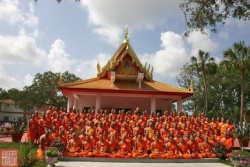Bhiksu
Bhiksu (Sanskrit) / Bhikkhu (Pali): A Buddhist monk; a man who has given up the Householder's Life to live a Life of heightened virtue (sila) in accordance with the Vinaya in general, and the Patimokkha rules in particular. One of the four primary classes of Buddhist disciples, the male who has taken the monastic precepts.
“Monk, male member of the Buddhist sangha who has entered homelessness and received full ordination. In ancient times the bhikshus formed the nucleus of the Buddhist community, since according to the early Buddhist view, only a person who had renounced the world could reach the supreme goal, Nirvana. The main activities of bhikshus are meditating and presenting the Dharma. They are not allowed to work. Buddhist monks renounce the amenities of the world and lead a life of wandering. The basic principles of the monastic life are poverty, celibacy, and peaceableness. The lifestyle is governed by the rules laid down in the Vinaya pitaka.”
Hump: 43
A Bhiksu’s life is governed by 250 precepts under the most common monastic code.
“The Three Thousand Awesome Demeanors of monks and nuns are derived from the four deportments: walking, standing, sitting and lying down. It is said, ‘Walk like the wind, stand like a pine;/ Sit like a bell and lie like a bow.’ Walking like the wind does not mean imitating a tornado, nor even the kind of half jog that many people use to get from one place to another. The wind which should serve as a model for walking is the gentle zephyr, which does not even ripple the surface of a still pond. To stand like a pine is to stand up straight, not slumped over as if totally devoid of energy. The head should not hang as if looking only at the ground; the gaze should be regulated and should not dart furtively back and forth like that of a thief. To sit like a bell is to be erect and solid yet quite natural and spontaneous. In lying down, the legs should be drawn up slightly like a bow.”
Hua / Earth Store: n the beginning all Bhiksus without exception led a life of wandering. During the rainy period, however, they were obliged to spend three months in a monastery (vihara). According to tradition the reason for this was that during the rainy season a wandering monk could cause too much damage to the animal and plant worlds. During this period of repose, leaving the monastery was permitted only under certain conditions, such as visiting … the sick.” Sham: 20
Warning
“When a monk lives in the age of the True Law, he should never make discriminations in regard to people. But when a monk lives in this age of the Degenerate Law, he should fear nothing more than failing to make discriminations in regard to people. The reason is that in this last age of the Law, good and bad elements mingle together. If one does not make a right judgement but chooses the wrong person, if one regards him who is heterodox as orthodox, if one becomes friendly with him whom he ought to avoid and avoids him with whom he ought to be friendly, one will surely become the same as one’s teacher.
Furthermore, in future lives he will always be a companion to Mara (q.v.). Is it then not apparent that one has to be watchful in seeking out a teacher?” (Patriarch Chu Hung) denoting a follower of Sakyamuni Buddha.”
Yu: 177
Note: “Master Tao-An (China – 4th c. A.D.) was the first priest to call himself Shih ( Jpn /Shaku; Vn / Thích), abbreviation of Sakyamuni,
See also: Bhikkhu
